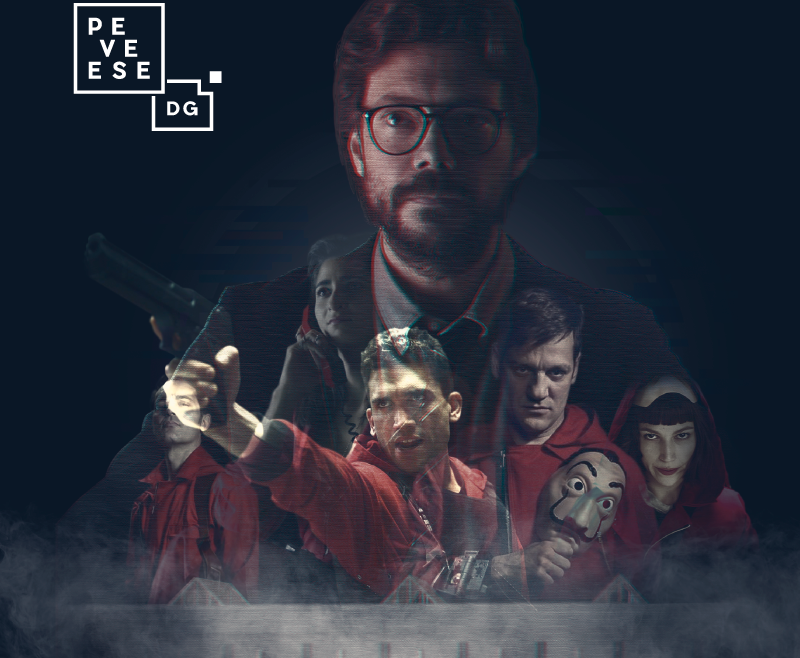
During his time in Colombia, Álvaro Morte, the professor at the Casa de Papel, gave some advice on leadership, not to direct a robbery, but to manage a team.
This note will not teach you how to enter the National Mint and Stamp Factory or the Bank of Spain to print more than US $ 1,100 million or remove the gold bars in pebbles. What he does intend is to rescue the management lessons left by the millimetric robbery plan staged in La Casa de Papel, so that you, in your company, can also meet your goals, even in the most difficult situations.
This production, which became the most watched Spanish-language series on Netflix and which recently premiered its third season, has different protagonists, each with a type of leadership.
For example, the Berlin character is the head of the robbery of the Spanish Mint and Stamp Factory from within, although his autocratic leadership is not fully maintained. Direct and eloquent, the thief fails to generate empathy with the team regarding his decisions, which causes him to be relieved at a point in history. “You can see many types of leadership in La Casa de Papel, but The Professor seduces by the demonstration of his intellect,” explained Andrés Ramírez, a Plurum consultant.
In fact, the profile of The Professor, a role played by Álvaro Morte, is considered a transformational leader: one who with a single vision seeks to generate a substantial change in his reality and makes another part of that evolution.
The character takes his alias from a teaching process that he imparts to his teammates and that lasts for months. His explanatory and clear tone also generates empathy among his students, who make up his work team.
At this point, his training capacity stands out. This means that you take time to know the strengths and weaknesses of the band, and thus enhance them through training processes, both technical and psychological.
Acknowledge the other’s knowledge
“If you think you have control over everything, you are lost,” Morte said of his role as leader of the band. In fact, from the beginning The Professor insists that each of those summoned in the first season brings a special and necessary ability to the plan. That means that he recognized the knowledge of each one to execute the plan.
One through a common purpose
All the protagonists are constantly directed towards their goal. “Part of the La Casa de Papel revolution and what people get hooked on is that thieves go against a system they think is mismanaged. That unites the protagonists towards a common goal. Even though it is a robbery, it generates a certain empathy, ”explained Andrés Ramírez, a Plurum consultant.
Think of all possible scenarios
A leader must think of all possible scenarios while executing his strategy. As if it were a game of chess, The Professor is always one step ahead. If something goes wrong somewhere in your plan, you are prepared and have a protocol in place to continue to achieve your goal. Of course, always taking care of the integrity of the members of your team.
Show your strategic ability
“Without a doubt, people fall in love with his intellect and strategic capacity,” Ramírez added about El Professor. The leader of the gang always shows that he has a plan, that he knows it better than anyone and that he would not give signals or missteps if he did not consider the results. As it can order all the forces to reach an ultimate goal, it generates confidence in decisions.
Create a staging universe
That confidence that he generates in a leader in his team comes not only from his empathy, but also from his preparation. This point goes very hand in hand with the knowledge of the talents of the team so that the leader can take advantage of them. In fact, the educational quality and the interest of The Professor to enhance his skills are vital in moments of life and death in the series.
Think long-term processes
“For The Professor, the robbery was never about money itself, but about a blow to the system,” Morte said about his character. For this, the Professor patiently devised a plan, considered the precise moments and conditions to execute it, estimated a time for the convocation and preparation. During this period, he was also able to develop skills and establish contacts necessary to achieve the robbery.
Guide through the good use of technology
This point is closely related to the previous one. The series shows the fundamental role of technology and communications to be aware of each step of a process or operation. This not only means that the leader can supervise his subordinates, but that he can help them to solve the unforeseen in the situations that present themselves.
Delegate tasks
So that the Professor can exercise his leadership remotely, as if it were a telework day, he places great trust in the training process he carried out with his team. According to Ramírez, this level of autonomy, trust and control, despite not being part of the operation, is achieved thanks to the fact that the leader of the gang knew how to delegate his tasks.
Source: Article taken from La República
JULY 26, 2019



